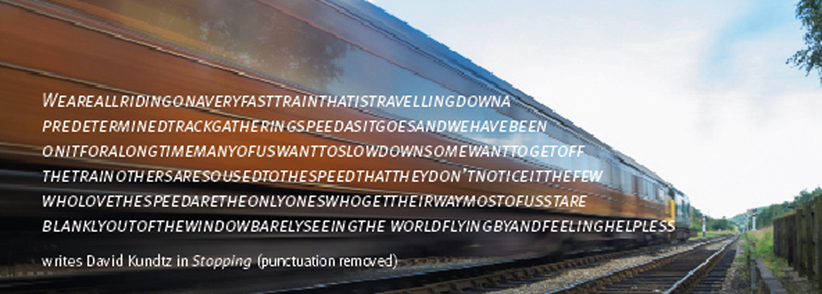This article was published in the May to August 2016 issue of Rapport magazine.
Bev Shepherd considers how spending time in prayer enables us to receive God’s love and restoration
 Just as punctuation helps us make sense of what we read, so the pauses, still points and full stops of our lives help us live meaningfully: without them we will find it difficult to connect with God, others and our own self. Yet being still challenges our sense of worth in a society (and church?) that values activity. Perhaps this is also why so many of us struggle with prayer. ‘Prayer is being unbusy with God instead of being busy with other things. Prayer is primarily to do nothing useful or productive in the presence of God. To not be useful is to remind myself that if anything important or fruitful happens through prayer, it is God who achieves the result.’ writes Henri Nouwen in Spiritual Formation.
Just as punctuation helps us make sense of what we read, so the pauses, still points and full stops of our lives help us live meaningfully: without them we will find it difficult to connect with God, others and our own self. Yet being still challenges our sense of worth in a society (and church?) that values activity. Perhaps this is also why so many of us struggle with prayer. ‘Prayer is being unbusy with God instead of being busy with other things. Prayer is primarily to do nothing useful or productive in the presence of God. To not be useful is to remind myself that if anything important or fruitful happens through prayer, it is God who achieves the result.’ writes Henri Nouwen in Spiritual Formation.
More often than we would care to admit we approach prayer with the desired objective to ‘get what we’ve asked for’ – and quickly! If this is not received then we declare that prayer has not worked; that its results are, at best, arbitrary; or that we are just not a competent pray-er and so had best leave it to those who are. Yet, as P T Forsyth points out in The Soul of Prayer, ‘If we got all we asked for we should soon come to treat Him as a convenience, or the request as magic. The reason of much bewilderment about prayer is that we are less occupied about faith in God than about faith in prayer.’
I believe that whilst God often delights to answer our prayers and give us good gifts, His primary desire is that we, His children, through prayer, would develop a trusting relationship with Him – a relationship where we never doubt his goodness and love, nor His ability to do what He has promised. Every day is an opportunity to strengthen our ‘trust’ muscle, and times of waiting can be vital in this process.
God created time. He instituted day and night, seasons, festivals, holy days, and the rhythms of sabbath days and years. As time answers to God and not the other way round, it is impossible that He could be late.
Our trust in God’s timing develops most when we have to wait – especially if there is no guaranteed end date. Waiting will always be a part of the Christian journey – why else would patience be listed as a fruit of the Spirit (Galatians 5:22) or Paul pray that ‘you may have great endurance and patience’ (Colossians 1:11)? Our culture encourages us to see waiting as a negative thing – a waste of time in which nothing productive happens. Hence anything labelled ‘quick’, ‘instant’, ‘rapid’ or ‘fast’ is guaranteed to sell. As a result we feel pressure to be constantly ‘on the go’ and ‘fill every minute’. Yet this can leave us both exhausted and bored – in danger of losing any sense of purpose and meaning.
Prayer has the potential to ground us, to help us to return to that place where we are connected to God, to His love, and to the sense of meaning and purpose He intends for our lives. So when we feel that ‘We are all riding on a very fast train that is travelling down a predetermined track gathering speed as it goes,’ as David Kundtz puts it, prayer is the place where we can regain our bearings, recalibrate our values, and allow God to restore
our lives.
God’s invitation to meet Him in prayer is available to each of us. There is no qualification needed, no techniques to be mastered, and no hoops to be jumped through. We can be sure of the same welcome from our compassionate heavenly father that the prodigal son received in Luke 15:20. All it takes is for us to ‘come to our senses’ (Luke 15:17) and keep the appointment – to dare to stop and be ‘unbusy’ with God.
Bev Shepherd
Join us at Lee Abbey Devon for “Exploring Prayer“
Mon 6 to Fri 10 June 2016 with Beverley Shepherd
Prayer is a vital part of our love relationship with God. Whether you struggle with prayer or find it a joy, it is always helpful to develop and refresh our praying. Together we will explore a variety of ways of praying using scripture, music, pictures and nature – allowing God, who longs to communicate with us, to touch our senses, imagination and emotions as well as our minds.
